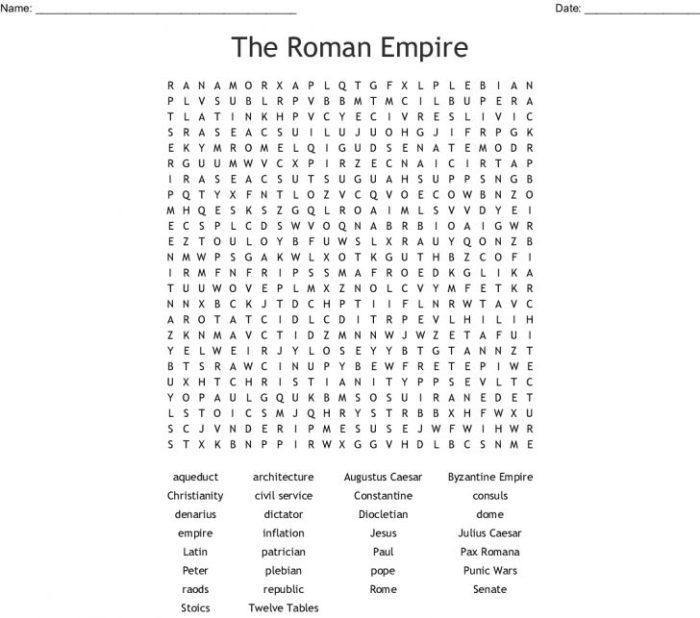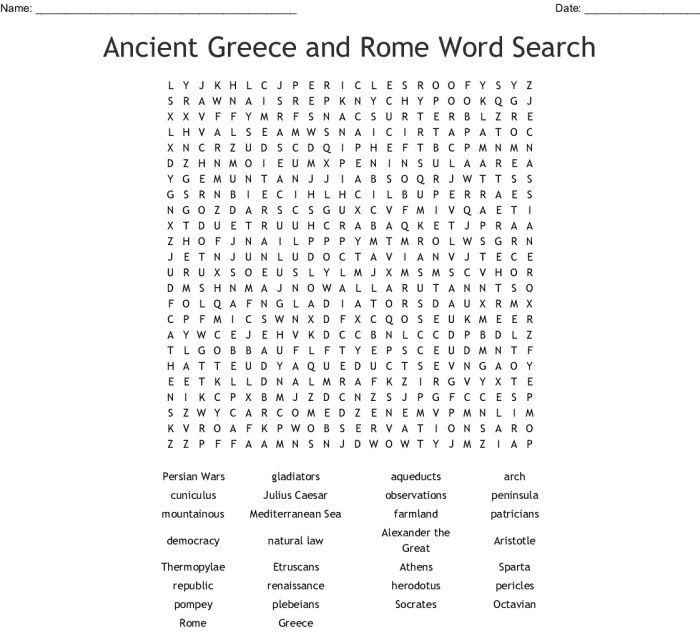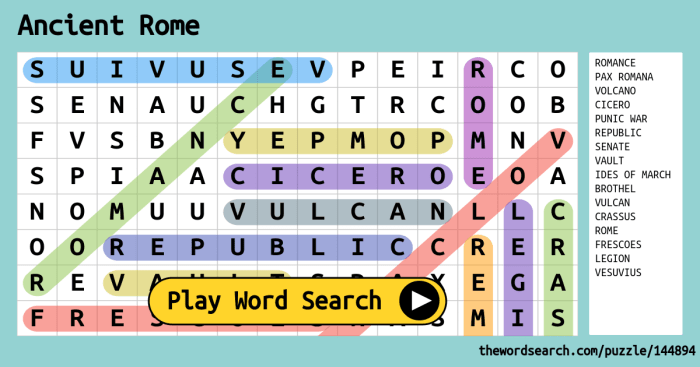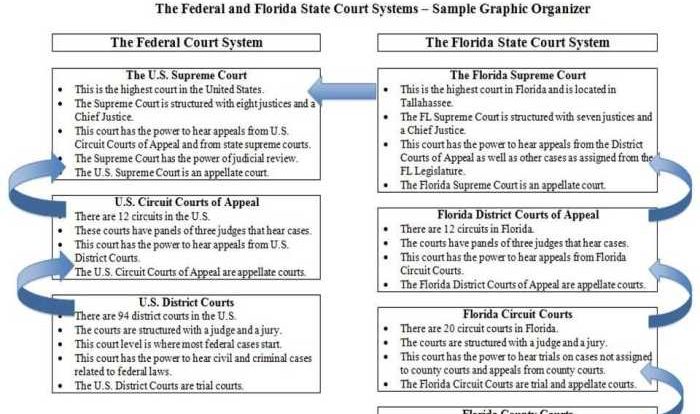Unveiling the Ancient Rome Word Search Answer Key is an exciting journey that leads us through the grandeur and complexities of ancient Roman civilization. This comprehensive resource unravels the meanings behind enigmatic Roman words, immersing us in a bygone era where history and culture intertwine.
From the majestic Colosseum to the enduring influence of Roman law, this guide illuminates the indelible mark Rome left on the world stage, shaping the foundations of Western civilization as we know it.
Ancient Rome Vocabulary
The ancient Romans developed a rich and complex language, which has had a profound influence on Western civilization. Here is a list of some common ancient Roman words and their meanings:
- Senatus: Senate
- Caesar: Emperor
- Augustus: First emperor of Rome
- Consul: Chief magistrate of Rome
- Legatus: Military commander
- Cohors: Cohort (unit of infantry)
- Centurio: Centurion (officer in the Roman army)
- Forum: Public square
- Circus: Arena for chariot races
- Thermae: Public baths
Roman Civilization
The Roman Empire was one of the most powerful and influential civilizations in history. It spanned over two millennia and covered a vast territory, stretching from the Atlantic Ocean to the Persian Gulf. The Romans made significant contributions to Western civilization in areas such as law, government, architecture, engineering, and literature.
Some of the key figures in Roman history include Julius Caesar, Augustus, Cicero, and Marcus Aurelius. Important events include the Punic Wars, the Roman Republic, and the rise of Christianity. Roman innovations include the development of concrete, the aqueduct, and the calendar.
Roman Culture

The ancient Romans had a rich and diverse culture. They were known for their love of public spectacles, such as chariot races and gladiatorial contests. They also enjoyed attending the theater, where they could watch comedies, tragedies, and mimes.
The Romans were also very religious. They believed in a pantheon of gods and goddesses, including Jupiter, Juno, and Mars. They built temples and shrines to honor these gods and offered sacrifices to them.
Roman art was heavily influenced by Greek art. However, the Romans also developed their own unique style, which can be seen in their sculptures, paintings, and mosaics.
Roman Architecture and Engineering

The ancient Romans were master builders. They constructed some of the most impressive structures in the world, including the Colosseum, the Pantheon, and the Appian Way.
Roman architecture was characterized by its use of arches, vaults, and domes. These structures were not only beautiful, but they were also very strong and durable.
The Romans were also skilled engineers. They developed a system of aqueducts that brought water to Rome from distant sources. They also built roads and bridges that connected the different parts of their empire.
Roman Military: Ancient Rome Word Search Answer Key

The Roman army was one of the most powerful and disciplined fighting forces in history. It was organized into legions, each of which consisted of about 5,000 men.
The Roman army was equipped with a variety of weapons, including swords, spears, and bows and arrows. They also used siege engines to attack enemy fortifications.
The Roman army was responsible for expanding and defending the Roman Empire. It fought in numerous wars, including the Punic Wars, the Gallic Wars, and the Roman-Persian Wars.
Roman Legacy
The Roman Empire left a lasting legacy on Western civilization. Roman law, language, and culture continue to influence the world today.
Roman law is the foundation of many modern legal systems. The Roman language, Latin, is the ancestor of many modern European languages. Roman culture has influenced everything from art and architecture to literature and philosophy.
The Roman Empire was one of the most important civilizations in history. Its legacy continues to shape the world today.
FAQ Compilation
What is the significance of the Roman Empire?
The Roman Empire was a dominant force in Western civilization for over five centuries, leaving a lasting legacy in law, government, language, and culture.
Who were some key figures in Roman history?
Julius Caesar, Augustus, and Constantine were among the most influential emperors, while Cicero and Virgil were renowned literary figures.
What were some of the major innovations of the Roman civilization?
The Romans developed concrete, aqueducts, and a sophisticated system of roads, which facilitated trade and communication.
